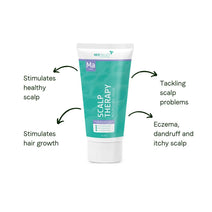A sore scalp: Everything you need to know about scalp inflammation
Dandruff
Dandruff manifests as small, white or yellow flakes that appear on the scalp and, in advanced stages, also in the hair. Dandruff is common in people with dry skin, but it can also be caused by excess oil or dirt. It is often caused by overactive sebaceous glands or a fungal infection of the scalp. Dandruff irritates the skin and can cause an inflamed scalp, especially if left untreated for a long time.
Itching
An itchy scalp can be caused by dandruff or various diseases, but can also be temporary, for example due to an infection or allergic reaction. If you have a sensitive scalp and the hair care products you use are too aggressive, your head and hair roots get very irritated. Therefore, intolerances and allergies to certain hair care products or other substances are a common cause of scalp itching and pain. Fortunately, this can be quickly remedied by using hair care products for sensitive skin. It is important to avoid scratching despite the itching, as this only provides short-term relief, but can eventually worsen the condition and cause even more severe inflammation of the scalp.
Seborrheic eczema
Eczema is a common cause of inflammation on the scalp. Especially well-known is seborrheic eczema, which is an aggravated form of dandruff and is characterised by inflammation and scaling on the scalp and face. It can also affect other parts of the body where the skin is oilier, such as the chest or back. Seborrheic eczema is caused by an overproduction of sebum, which irritates the skin and causes inflammation. The skin condition can be recognised by a painful, itchy and scaly scalp. This condition is characterised by a painful, itchy and flaky scalp.
Psoriasis
Psoriasis is known as a chronic autoimmune disease. It is characterised by severe flaking on the scalp or other parts of the body and requires medical treatment. In addition to an inflamed scalp, psoriasis can spread to the entire scalp in severe form and lead to painful, itchy and inflamed areas of skin.
Folliculitis
Are your hair roots and hairline sensitive? Then folliculitis could be a possible cause of this pain, as a pus head forms on the hair follicle, which usually retracts on its own. This condition can affect people of all ages and genders and can lead to unpleasant irritation of the inflamed skin areas.
Tinea capitis
Tinea capitis is a fungal infection of the scalp that can lead to painful, itchy and scaly patches. This infection is more common in children and is highly contagious, so it is transmitted by close contact with affected people through the flaking skin flakes. The symptoms of tinea capitis can look a lot like dandruff or seborrheic eczema, but can also cause hair loss and crusting.
Other triggers
If the scalp hurts, it is not necessarily the result of an illness. Dryness, increased sun exposure, chemical treatments or excessive use of styling products can also lead to a sore scalp.
Dryness, increased sun exposure, chemical treatments or excessive use of styling products can also lead to a sore scalp.
Do you suffer from a sensitive scalp and feel that inflammation based on the aforementioned causes is responsible for the sore scalp? If so, you should start by avoiding the use of harsh chemicals and hair products that can further irritate your scalp as much as possible. We recommend treatment with clinically tested products to relieve scalp pain, inhibit inflammation and prevent the condition from worsening and eventually leading to a form of hair loss. Treatment with special products for the scalp, such as those from the Neofollics Scalp Therapy line, are suitable for this purpose. This combination pack contains three different products specially designed to treat a painful and irritated scalp: a mild shampoo, a scalp lotion and a hair serum. The shampoo gently cleanses the scalp and removes excess sebum and dirt without further stressing the scalp. The scalp lotion soothes and moisturises the scalp to relieve itching and pain, while the serum stimulates hair growth and promotes a healthy scalp. If you are unsure of the cause or notice a worsening of pain on your scalp, hair roots or even nerves on the scalp, despite using the treatment pack, a visit to the doctor is recommended to solve the problem or identify any underlying causes.Treatments for a sore scalp













